Wireless networks and ICT have already changed the field of technology,
and there is potential to integrate them into cognitive science as well.
The EU-funded project 'Cognitive-networks-enabled transnational
proactive healthcare (Conhealth)' (
CONHEALTH)
has started building a consortium of researchers, students, academics
and industry members to exchange knowledge about different aspects the
field.
Due to the nature of the project, clinical trials will not be
included. The research is simulation- and lab-based, and will provide
insight into the design and planning of future trials. Research topics
to be covered include cognitive radio and radar networks for optimising
health care delivery; cognitive sensors for optimising health care
delivery; and privacy and security solutions for cognitive networks in
health care.
The project is divided into six phases. The first phase focuses on
discussions about the framework of the project, with a review of
potential scenarios, definitions and requirements. The second will
investigate cognitive radio and radar networks for optimising health.
During the third phase, researchers will lay out fundamental information
of cognitive networks for optimising health care delivery. The fourth
phase will study privacy and threats of security to cognitive networks.
During the fifth phase, researchers will design and develop a
proof-of-concept cognitive network platform integrating information from
the earlier phases. At the end of the project, findings will be
consolidated and results disseminated.
Simulations and lab-based experimentation have begun. In addition,
two workshops have been organised and more than 50 peer-reviewed papers
have been published. Other accomplishments include identifying
challenges and scenarios regarding networks and health monitoring
systems, identifying an energy harvesting scheme, identifying a relaying
scheme, optimising transmission strategies to improve privacy in wire
channels, and analysing realistic channel models of receivers.
Project results have the potential to influence actual clinical
trials on cognitive networks down the road. Progress in this area will
ultimately enhance the relationship between technology and cognitive
science.

